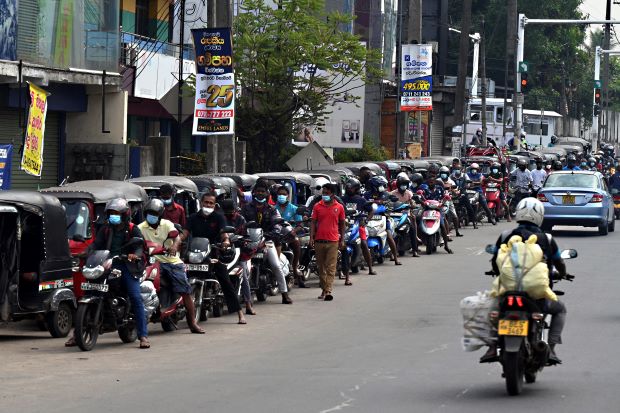With gas pumps all but dry, Sri Lanka faces its ‘most difficult time’

By Mujib Mashal
COLOMBO — When he was turned away from a gas station in Sri Lanka’s capital Monday (16) after waiting in line for six hours, Ravi Chandra, a tour manager, decided to return before dawn the next day to see if his luck would improve.
Tuesday (17) was no better: Five hours in, the pump was still covered with ‘No Petrol’ signs and sealed in yellow crime-scene tape. “They say they are out of petrol, and they don’t know when they will get more,” he said.
A day after Sri Lanka’s new prime minister warned that his first peek into the government’s books had revealed an economic crisis even worse than imagined, the island nation found itself all but out of fuel, with life growing increasingly miserable for its 22 million residents.
Ranil Wickremesinghe, who took on the role last week as widespread protests forced his predecessor into hiding on a military base, said on national television Monday that the government could not find even $5 million to import gasoline. With no money to pay them, fuel ships remained anchored offshore in Sri Lankan waters, their cargos out of reach.
“The next couple of months will be the most difficult ones of our lives,” Wickremesinghe said in his address to the nation.
Despite years of warnings that the ruling Rajapaksa family was mismanaging the country, the dizzying pace of Sri Lanka’s economic collapse in the past few months has brought economic desperation that many describe as even worse and more widespread than during the nation’s three-decade-long civil war that ended in 2009.
The country had kept borrowing beyond its means to feed the needs of a bloated system, a large military, and the vanities of a leadership that took on huge post-war construction projects with questionable economic logic. When pandemic restrictions dried up the flow of tourism dollars and the debt piled up to unsustainable levels, the leaders showed little urgency in finding solutions or seeking help.
Now, a large part of the population is struggling to scratch together three meals a day, and cooking gas has been out for weeks. Hospitals are short on lifesaving medicines because pharmaceutical companies have not been paid for months.
Weeks of protests have rid the government of all the Rajapaksas except the president, Gotabaya. His brother Mahinda Rajapaksa, the prime minister, departed last week after inciting his supporters to attack peaceful protesters, unleashing a wave of violence and anarchy. Mahinda Rajapaksa, along with other family members who served in senior government positions, were flown to the safety of a naval base.
Wickremesinghe, 73, who became prime minister for the sixth time, said he had begun trying to gather information on the state of the economy. The country will bring in far less in revenue than had been predicted by the previous government, he said, ballooning the budget deficit. He said he would be forced to print more money to pay government salaries, which will only further depreciate a currency that has fallen about 40% against the dollar over the past couple of months.
The most damning figure in his speech Monday was the clear admission on the fall in foreign reserves, which he said had stood at $7.5 billion when the Rajapaksas returned to power in 2019 after a five-year gap and had since fallen to almost nothing.
Wickremesinghe said he was seeking urgent aid from allied countries. The government is also working with the International Monetary Fund (IMF) to secure assistance and restructure its foreign debt, which last month it had declared it would be unable to pay. But Sri Lanka’s political crisis has undermined the IMF negotiations, and officials and diplomats say any tangible help could be months away.
The revelations of the economy’s dire state came on the second day of the Buddhist Vesak festival. In better times, families would light lanterns and gather in parks and public places for festivities. Neighbourhoods would be peppered with Dansal stalls — offerings of food, drinks and sweets to anyone who came by.
On the first day of the festival, protesters who have been camped outside the presidential secretariat for weeks marched by the thousands in Colombo, circling the barricaded residence of the new prime minister and continuing their call for the president’s resignation.
“Usually, the country would shut down to celebrate,” said Manisha Balraj, a lawyer who had joined the protest. “But obviously, because of the fuel shortage, the economic crisis, we can’t.”
Among the protesters was Piyal Dissanayake, 54, who had taken a bus in the morning with his family from the town of Mawanella, about 70 miles from Colombo. A Sri Lankan flag neatly folded over his arm, he marched with his wife and two children. He had cut his staff of seven at his small restaurant down to three, and the establishment remained shut most days.
The family planned to take a bus home in the evening but was nervous that finding one might prove hard because of the fuel shortage.
“This is the most difficult time in my lifetime,” Dissanayake said. “Even during the war, it wasn’t this difficult,” he added.
Outside a government-subsidized milk dispensary behind the US Embassy in Colombo on Tuesday, Saminda Manimperi stood in line in the shade of a wall for three hours before it opened. A cashier at a coal plant, he was there for the five packets of 400-gram powdered milk he gets twice a week for himself and his mother.
He said his salary had already been shaved about 30% since the crisis began, even as food prices have shot up. To be able to get milk at a discount, he would have to miss work.
“I was marked absent, so that’s 2,000 rupees cut,” he said, from a salary that is down to 35,000 rupees a month, or about $100.
-New York Times

